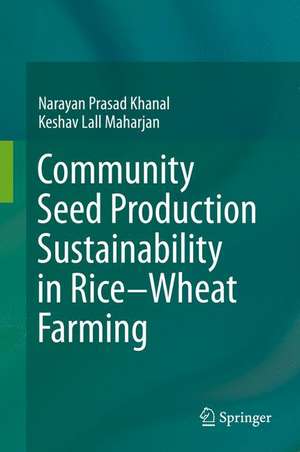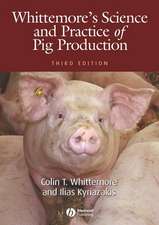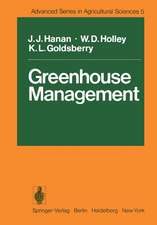Community Seed Production Sustainability in Rice-Wheat Farming
Autor Narayan Prasad Khanal, Keshav Lall Maharjanen Limba Engleză Hardback – 20 mai 2015
This book discusses the issues of organizational governance of the community seed producers’ groups and links them with household-level benefits to understand the organizational dynamism and the probable development paths of such organizations in the future. It also highlights the necessity to institutionalize lessons learned in community seed production in the stakeholders’ programs and policies. These understandings provide a basis for formulating policies for strengthening the system in developing countries. Students, researchers, policy makers and donor agencies working with CSP in the developing world will find this book useful in broadening their understanding of CSP in general and its sustainability in particular.
| Toate formatele și edițiile | Preț | Express |
|---|---|---|
| Paperback (1) | 552.49 lei 38-44 zile | |
| Springer – 29 oct 2016 | 552.49 lei 38-44 zile | |
| Hardback (1) | 641.85 lei 6-8 săpt. | |
| Springer – 20 mai 2015 | 641.85 lei 6-8 săpt. |
Preț: 641.85 lei
Preț vechi: 755.13 lei
-15% Nou
Puncte Express: 963
Preț estimativ în valută:
122.86€ • 133.49$ • 103.27£
122.86€ • 133.49$ • 103.27£
Carte tipărită la comandă
Livrare economică 21 aprilie-05 mai
Preluare comenzi: 021 569.72.76
Specificații
ISBN-13: 9784431554738
ISBN-10: 4431554734
Pagini: 200
Ilustrații: XX, 177 p. 37 illus., 28 illus. in color.
Dimensiuni: 155 x 235 x 15 mm
Greutate: 0.46 kg
Ediția:2015
Editura: Springer
Colecția Springer
Locul publicării:Tokyo, Japan
ISBN-10: 4431554734
Pagini: 200
Ilustrații: XX, 177 p. 37 illus., 28 illus. in color.
Dimensiuni: 155 x 235 x 15 mm
Greutate: 0.46 kg
Ediția:2015
Editura: Springer
Colecția Springer
Locul publicării:Tokyo, Japan
Public țintă
ResearchCuprins
1 Rice–Wheat Farming at a Glance.- 2 Fundamentals of Community Seed Production.- 3 A Framework for Analyzing Sustainability of Community Seed Production.- 4 Farmers’ Behavior in Buying Rice and Wheat Seed from Market.- 5 Technical Efficiency in Rice and Wheat Seed Production.- 6 Profit Efficiency in Seed Production under Rice–Wheat Farming.- 7 Households’ Behavior in Selling Rice and Wheat Seed in The Market.- 8 Adoption of Soil Conservation Practices in Rice–Wheat.- Farming.- 9 Risk Management in Community Seed Production under Rice–Wheat Cropping System.- 10 Organizational Governance and its Relationship to Household-Level Economic Indicators: Evidence from Community Seed Production.- 11 Institutionalization of Community Seed Production.
Textul de pe ultima copertă
This book analyzes the sustainability of community seed production under a rice–wheat farming system from microeconomic perspectives, considering how seed producers benefit from community seed production and how those benefits continue into the future. Seed producers’ performance in resource management, governance, and marketing strategies indicates current benefits, whereas soil conservation and risk-management practices provide the basis for future benefits. Community seed production is a local-level seed management system owned by farmers. This system provides the institutional mechanism to supply diversified seed demands of open-pollinated varieties of food crops in a cost-effective way in rural regions. Being able to address the concerns of food insecurity, poverty, climate stress, and biodiversity loss in programs and policies of development agencies, community seed production is gaining popularity among the farmers and the policy makers in developing countries.
This book discusses the issues of organizational governance of the community seed producers’ groups and links them with household-level benefits to understand the organizational dynamism and the probable development paths of such organizations in the future. It also highlights the necessity to institutionalize lessons learned in community seed production in the stakeholders’ programs and policies. These understandings provide a basis for formulating policies for strengthening the system in developing countries. Students, researchers, policy makers, and donor agencies working with CSP in the developing world will find this book useful in broadening their understanding of CSP in general and its sustainability in particular.
This book discusses the issues of organizational governance of the community seed producers’ groups and links them with household-level benefits to understand the organizational dynamism and the probable development paths of such organizations in the future. It also highlights the necessity to institutionalize lessons learned in community seed production in the stakeholders’ programs and policies. These understandings provide a basis for formulating policies for strengthening the system in developing countries. Students, researchers, policy makers, and donor agencies working with CSP in the developing world will find this book useful in broadening their understanding of CSP in general and its sustainability in particular.
Caracteristici
Analyzes sustainability of community seed production in rice–wheat farming from economic, environmental, social, and institutional perspectives Focuses on community seed production in programs related to food security, climate change, biodiversity, and poverty reduction, among other aspects Measures organizational governance of the community seed producers groups and links it with household-level benefits to provide a basis for policy formulation Includes a special chapter on institutionalization of community seed production that guides future directions in community seed production











